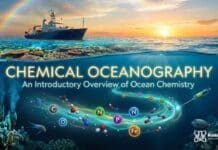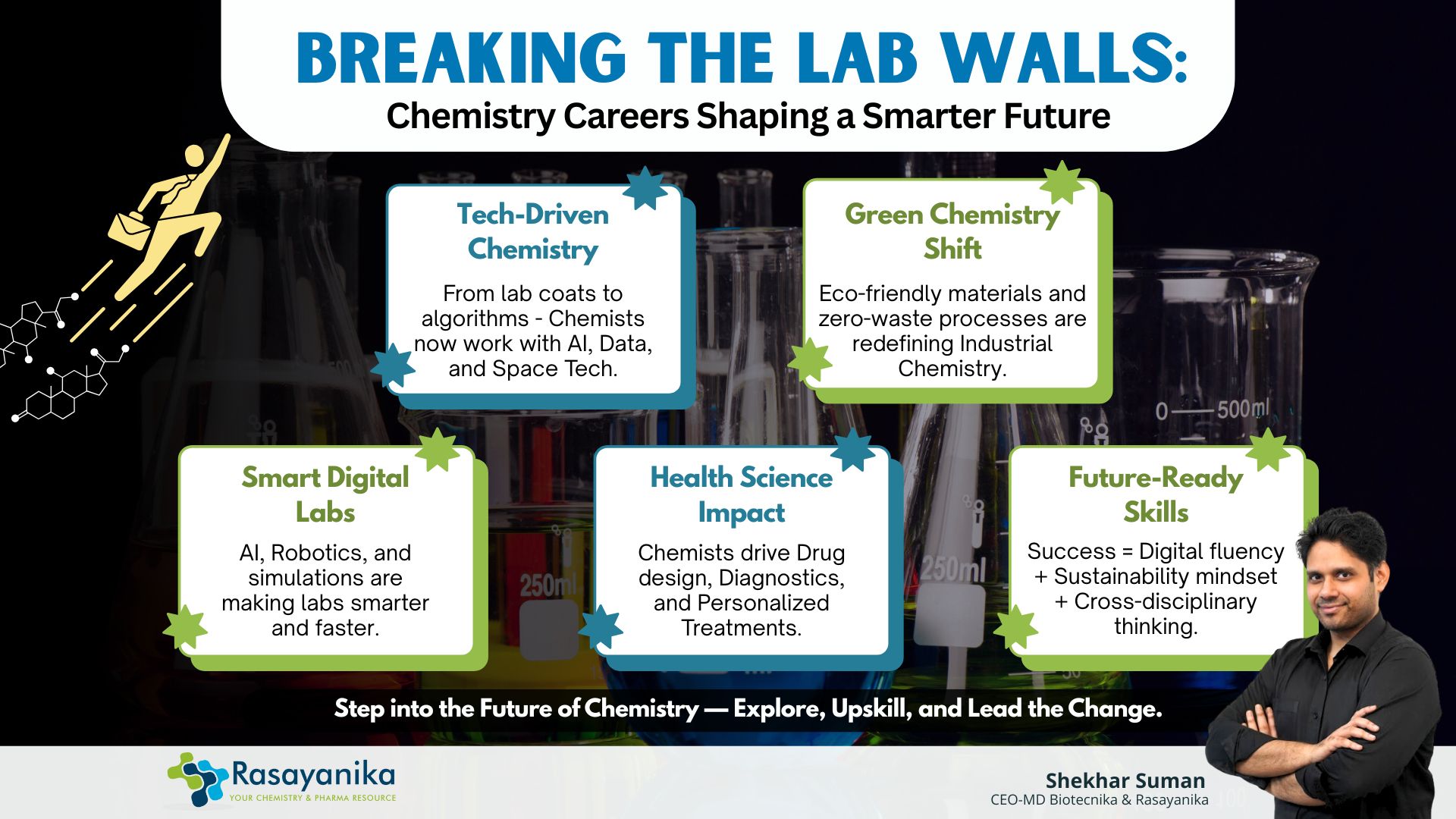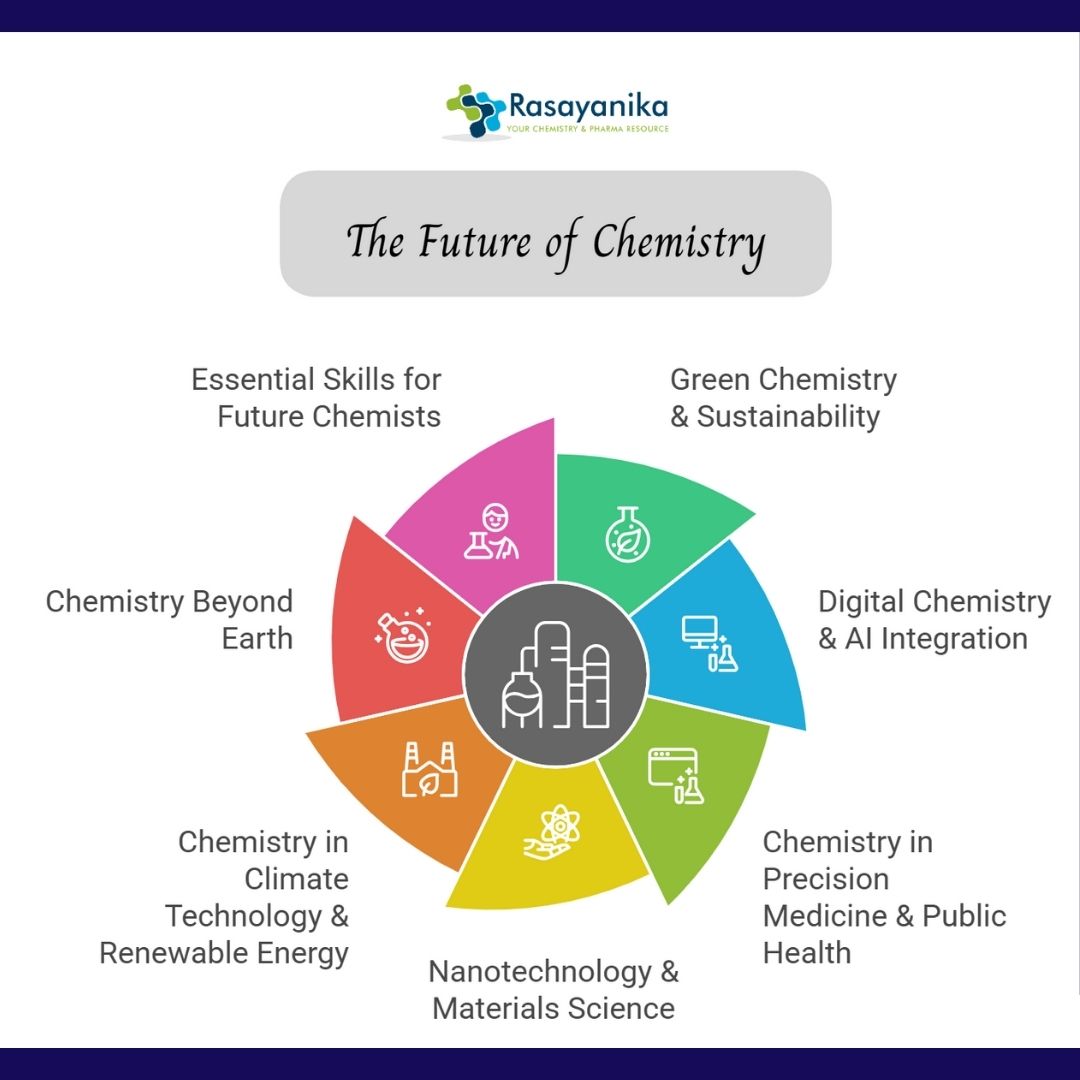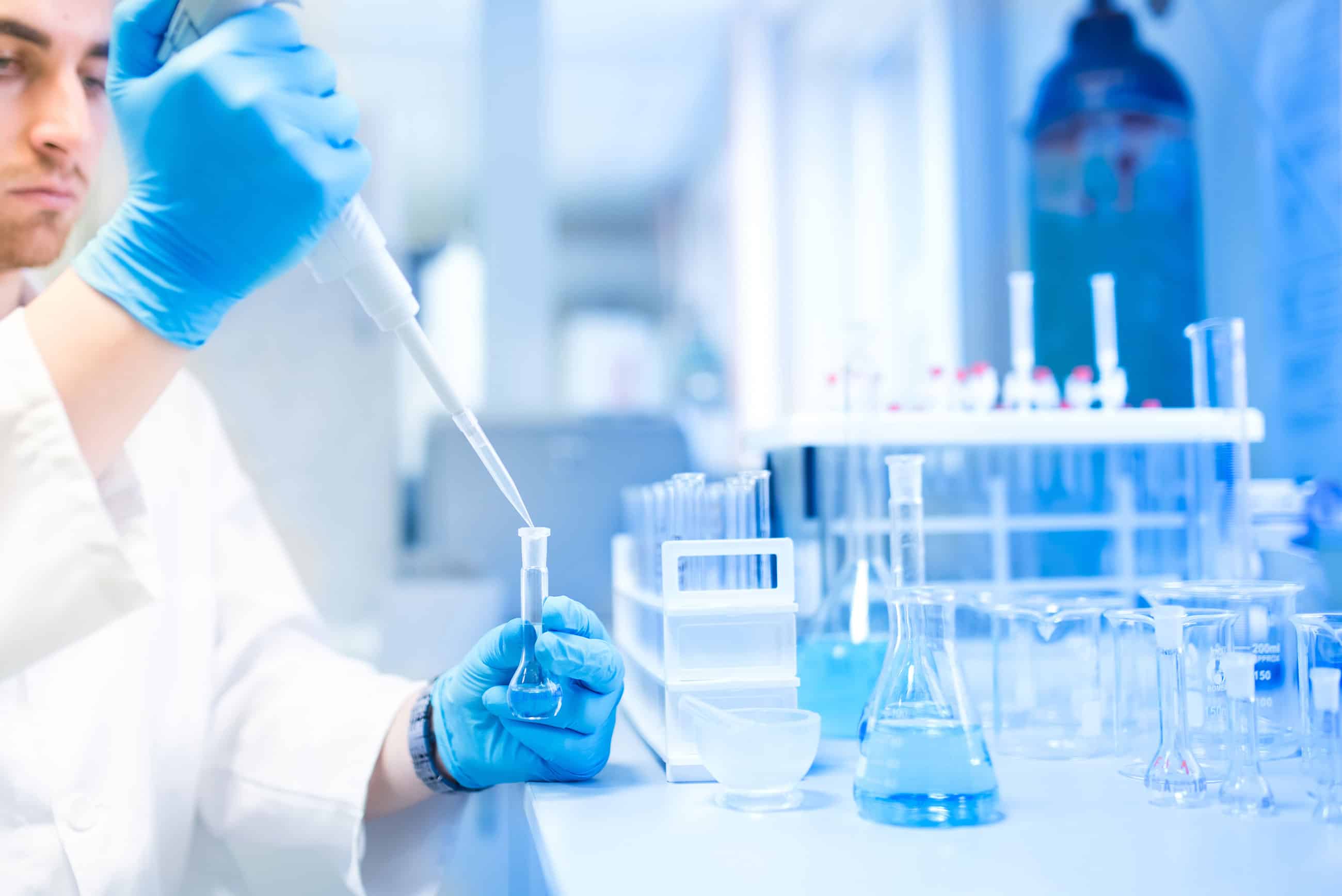Beyond the Lab: How Chemistry Careers Are Evolving in 2025
Anya recently got admitted to her dream University for her Postdoctoral Studies in Chemical Engineering. She was excited to start her journey at her visionary University and contribute to the University, humankind, as well as Mother Nature. In a small yet advanced laboratory in her University’s Science and Technology block, Anya once believed that Chemistry was a field filled with flasks, titrations, Chemical experiments, and formulas. However, as time passed and the world evolved, to her surprise, she now works with AI (Artificial Intelligence) and ML (Machine Learning) to design eco-friendly materials for global companies tackling climate change. Her journey mirrors the transformation happening across the world, where evolving Chemistry career opportunities are expanding beyond traditional roles and into domains we never imagined.
Chemistry is no longer restricted to the laboratories. It’s blending with Biotechnology, Sustainability, as well as Data Science, thereby shaping a future where chemists become pioneers of change and innovation. As we look back through the years, the Chemistry profession will continue to rapidly evolve, opening new doors to careers we couldn’t have imagined a decade ago.
As global priorities shift toward Healthcare advancement, Digitalization, and sustainability , Chemistry is emerging as a key player in solving pressing world challenges. Chemistry is entering a transformative and innovative era.
In the near future, Chemistry career opportunities will be more technology-driven, globally impactful, and interdisciplinary. For Researchers, Professionals, as well as Students in the Chemistry field, gaining an understanding of these changes is key to building a meaningful, future-ready career.
Anya’s journey isn’t out of the world, but it reflects a major transition happening across the field of Chemistry. Today’s Chemistry career roles are no longer limited to benchwork or the laboratory. It combines various disciplines, including Environmental Studies, Data Science, Public Health, and Engineering. This article explores how Chemists are working beyond the conventional laboratories to solve global challenges in entirely novel and innovative ways.
The Forces Driving Change In Chemistry Careers
Several global evolving trends shaping the future of Chemistry careers are:
- The rise in Carbon neutrality and Sustainability is accelerating growing demands for eco-friendly Chemical processes and Green materials.
- Automation and AI (Artificial Intelligence) are becoming essential tools in industrial applications and Chemical Research.
- Healthcare innovations are driving the need for personalized Drug Development, Biocompatible materials, and Precision Medicine.
- Climate and Energy Technologies requires chemical expertise to enable innovations in renewable systems, conversion, and storage.
- The growing interest in Space exploration is opening up new horizons for Chemistry beyond Earth.
These forces redefine and lay the foundation for evolving Chemistry career opportunities that align with sustainability, digital innovation, and space science..
01 Green Chemistry & Sustainability
By the end of this year, Chemistry professionals will be expected to prioritize environmental responsibility at every stage of product development, as well as in product manufacturing processes. Green Chemistry mainly aims to reduce toxicity, utilize renewable resources, as well as minimize wastage.
Chemistry Professionals associated with the Green Chemistry sector contribute to developing Sustainable and Green solutions across various industries, ranging from low-emission fuels to recyclable and materials and biodegradable packaging.
Some major Green Chemistry career roles include:
- Sustainable Process Chemist
- Environmental Impact Analyst
- Circular Economy Strategist
- Green Materials Researcher
Understanding and knowledge of life cycle assessments, eco-design principles, as well as Environmental regulations are fundamental for these career roles in Green Chemistry.
Chemists today work with policymakers, environmentalists, and product designers—bridging science with sustainability far beyond laboratory settings.
02 Digital Chemistry & AI Integration
Digital transformation in Chemistry is reshaping the industrial and Research operations globally. ML (Machine Learning) algorithms, robotic automation, as well as predictive modeling, are aiding in more accurate and faster experimentation in the Chemistry domain.
Chemistry professionals with expertise in digital tools and Data Analysis can lead the Chemistry sector in this new era. Professionals with the ability to blend Chemistry techniques with Computer Science expertise can create evolving Chemistry career opportunities in process optimization, materials development, as well as drug discovery.
Some major emerging Digital Chemistry career roles include:
- Cheminformatics Analyst
- AI-Driven Synthesis Designer
- Laboratory Automation Engineer
- Computational Chemist
Expertise in Programming Languages, including R, MATLAB, or Python, and knowledge of software utilized for Data Visualization and molecular simulation is appreciated.
No longer confined to benchwork and test tubes, Chemistry Professionals are now coding algorithms that simulate molecules well before a drop is measured in the laboratory.
03 Chemistry in Precision Medicine & Public Health
The Healthcare sector is becoming more patient-specific and data-driven, and the Chemistry domain is becoming a key factor in Precision Medicine and Public Health. Chemists are involved in creating Diagnostic Tools, designing controlled-release Chemical formulations, as well as developing targeted drug therapies.
With an increased focus on Biosecurity and global health preparedness, Chemistry Professionals are contributing to the Research and Development of immune-supportive compounds, antivirals, as well as vaccines.
Some major career roles include:
- Pharmaceutical Formulation Expert
- Medicinal Chemist
- Clinical Trials Analyst
- Biomedical Research Chemist
An in-depth understanding of Biochemistry, Pharmacology, and Organic Chemistry, combined with knowledge of Regulatory Standards, is essential for succeeding in this field.
04 Nanotechnology & Materials Science
Advancements in Materials Science are now creating novel products that were once thought impossible to make. It ranges from smart textiles and self-healing coatings to flexible electronics as well as ultralight aerospace composites.
Chemical knowledge is essential for the synthesis, testing, and discovery of these advanced materials. In the near future, this field of Materials Science and Nanotechnology will expand with a sharp focus on materials that are stronger, functionally versatile, more sustainable, and lighter in weight.
Some major Material Sciences & Nanotechnology career roles include:
- Advanced Polymer Chemist
- Nanomaterials Scientist
- Quantum Materials Developer
- Materials Innovation Specialist
Expertise in Molecular Design, Spectroscopy, as well as Nanofabrication will gain attention and be preferred in the future.
05 Chemistry in Climate Technology & Renewable Energy
The global shift to clean energy systems needs Chemical innovation at every level, i.e., from Sustainable catalysts to more efficient battery Chemistries for carbon capture and hydrogen production technologies. This transition is rapidly creating evolving Chemistry career opportunities in renewable energy, green infrastructure, and sustainable technologies.
Since the world is taking actions to respond to climate change, Chemists play a crucial role in optimizing energy storage, minimizing industrial emissions, as well as scaling renewable energy infrastructure.
Some major career roles in Renewable Energy & Climate Technology include:
- Battery Materials Chemist
- Electrochemical Engineer
- Carbon Utilization Scientist
- Green Hydrogen Developer
Chemists working in this domain should have an understanding of Thermodynamics, Energy Systems, Catalysis, and Reaction Engineering.
06 Chemistry Beyond Earth
Chemistry is not just limited to Earth, but is expanding into extraterrestrial horizons. Since Space missions have evolved from Research-focused to settlement-oriented developments, the essential need for Chemical innovation in radiation protection, resource extraction, as well as life-support systems is on the rise.
Astrochemists work on designing Chemical systems that can operate in zero gravity, generating fuel or oxygen from local planetary materials, as well as studying the atmospheres of various other planets in space.
Some major futuristic career roles include:
- Planetary Materials Analyst
- Space Systems Chemist
- Astrochemical Synthesis Expert
- ISRU (In-Situ Resource Utilization) Engineer
These career roles merge conventional Chemical knowledge with environmental control systems, Geology, and Aerospace Engineering.
07 Preparing for the Future: Skills That Will Matter Most
To achieve success in the field of Chemistry, professionals should possess evolving and diverse skills and expertise. The most valuable Chemical Professionals are those having:
- An understanding of the Sustainability principles and the ability to successfully apply them across projects in their sector
- Communicate effectively, both with Technical professionals as well as non-specialist audiences in public
- Adapt to change as well as encourage continuous learning and development
- Collaborate across various disciplines, working with Data scientists, Biologists, as well as Engineers.
- Are digitally literate and proficient with advanced Data Tools, Automation, as well as Software.
To remain relevant in this changing landscape, professionals must build skills aligned with evolving Chemistry career opportunities that require both scientific and digital literacy. Specialized courses, project-based learning, and certifications will help students and chemical professionals stay competitive and successful in this evolving landscape.
What the Future Holds for Chemistry Careers
As we look towards the future, the global demand for Chemists will increase tremendously. The world is facing a series of interconnected challenges, such as food security, emerging diseases, resource scarcity, as well as climate change. As the demand rises, evolving Chemistry career opportunities will play a critical role in addressing such challenges.
Chemistry will continue to be deeply embedded in global industries such as energy, Pharmaceuticals, Advanced manufacturing, Environmental Technology, as well as food and Agriculture. In developing economies, Chemistry careers will also be central to infrastructure development, local healthcare solutions, as well as clean water initiatives.
Ethical Research and Global collaboration will be increasingly emphasized. Chemistry professionals who can think globally, act sustainably, and innovate responsibly will become leaders in shaping a safer, healthier, and more resilient world.
The future of chemistry careers is filled with opportunity, purpose, and innovation. As the field expands into new futuristic domains as well as adopts cutting-edge technologies, Chemists will be at the forefront of real-world problem-solving.
These evolving Chemistry career opportunities are not only shaping industries but also empowering the next generation of chemists to lead with purpose. For aspiring students, this is a time to prepare with both scientific and digital literacy, as well as to explore emerging subfields and cultivate curiosity. For professionals already in the field, staying adaptable and open to lifelong learning will be key to remaining relevant and impactful.
In the future, Chemistry won’t just be about reactions and molecules, but will be about making the world better through Science. Now is the time to engage, lead, and prepare for the change. In every corner of the modern world, from satellites to smart fabrics, Chemistry is making its profound mark. Today’s Chemists are no longer just laboratory workers; they are global innovators, transforming Science into solutions far beyond the laboratory.



















































